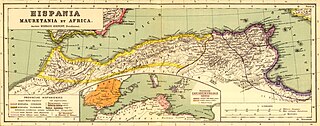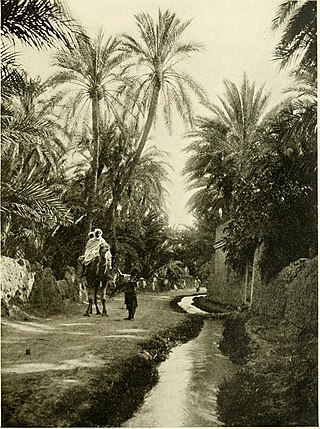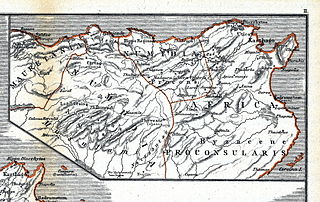Related Research Articles

Augustine of Hippo, also known as Saint Augustine, was a theologian and philosopher of Berber origin and the bishop of Hippo Regius in Numidia, Roman North Africa. His writings influenced the development of Western philosophy and Western Christianity, and he is viewed as one of the most important Church Fathers of the Latin Church in the Patristic Period. His many important works include The City of God, On Christian Doctrine, and Confessions.

Donatism was a Christian sect leading to a schism in the Church, in the region of the Church of Carthage, from the fourth to the sixth centuries. Donatists argued that Christian clergy must be faultless for their ministry to be effective and their prayers and sacraments to be valid. Donatism had its roots in the long-established Christian community of the Roman province Africa Proconsularis and Mauretania Tingitana, in the persecutions of Christians under Diocletian. Named after the Berber Christian bishop Donatus Magnus, Donatism flourished during the fourth and fifth centuries. Donatism mainly spread among the indigenous Berber population, and Donatists were able to blend Christianity with many of the Berber local customs.

The history of North Africa during the period of classical antiquity can be divided roughly into the history of Egypt in the east, the history of ancient Libya in the middle and the history of Numidia and Mauretania in the West.

Timgad was a Roman city in the Aurès Mountains of Algeria. It was founded by the Roman Emperor Trajan around 100 CE. The full name of the city was Colonia Marciana Ulpia Traiana Thamugadi. Emperor Trajan named the city in commemoration of his mother Marcia, eldest sister Ulpia Marciana, and father Marcus Ulpius Traianus.
The Circumcellions or Agonistici were bands of Roman Christian radicals in North Africa in the early to mid-4th century. They were considered heretical by the Catholic Church. They were initially concerned with remedying social grievances, but they became linked with the Donatist sect. They condemned poverty and slavery, and advocated canceling debt and freeing slaves.

Donatus Magnus, also known as Donatus of Casae Nigrae, was the leader of a schismatic Christian sect known as the Donatists in North Africa, Algeria. He is believed to have died in exile around 355.

Optatus, sometimes anglicized as Optate, was Bishop of Milevis, in Numidia, in the fourth century, remembered for his writings against Donatism.

Milevum was a Roman–Berber city in the Roman province of Numidia. It was located in present-day Mila in eastern Algeria.

Roman Tunisia initially included the early ancient Roman province of Africa, later renamed Africa Vetus. As the Roman empire expanded, the present Tunisia also included part of the province of Africa Nova.

Mutugenna or Muttegena was a colonia (town) of the Roman, Berber and Vandal empires, located in the Maghreb. The city is generally identified with the ruins at Ain-Tebla in modern Algeria. Mutugenna was also the locus of a bishopric and was an important site in the development of the Donatist schism.

Majorinus was the leader of a schismatic Christian sect in Roman North Africa known as the Donatists.
Felix, Bishop of Aptunga, in proconsular Africa was a 4th-century churchman, at the center of the Donatist controversy.

Vescera, also known as Ad Piscinam, was an ancient titular see and Roman colony in Roman North Africa. It has been identified as a site near Biskra in Algeria. It remains as a titular see of the Roman Catholic Church in the Province of Numidia.

Purpurius was a Donatist bishop from 305 to 320 AD, who was instrumental in establishing the Donatist movement of Roman North Africa.
Marcarius was an imperial notary sent in 340 to enforce an imperial edict against the Donatist community, in Bagai, Numidia, Roman North Africa.

Bagai was a Roman–Berber city in the province of Africa Proconsularis. It must have been of some reasonable size, as it was also the seat of an ancient Catholic bishopric. The ancient city has been identified with ruins at Ksar-Bagaï outside of Baghai, in the Aurès Mountains of the El Hamma District in Khenchela Province, Algeria.
Parmenian was a North African Donatist bishop, the successor of Donatus in the Donatist bishopric of Carthage. He wrote several works defending the rigorist views of the Donatists and is recognized as "the most famous Donatist writer of his day", but none of his writings have survived.

Petilianus was an eminent Donatist of the 5th century Roman North Africa, who is known to history through the letters he wrote to the Catholic Bishop Augustine of Hippo and discourses in Augustine's replies. Although most of what we know of him comes from Augustine, his main theology seems to have been "that the true church was only composed of those who were repentant."

Numidia was a Roman province on the North African coast, comprising roughly the territory of north-east Algeria.
Donatus of Bagaï, also known as Donatus of Aurasium, was an ancient Donatist bishop and martyr whose life and actions played a significant role in the complex religious landscape of 4th century Numidia. Despite being primarily known through hostile reports, notably found in Optatus' "Contra Parmenianum Donatistam" Donatus of Bagai left a lasting impact on the Donatist movement.
References
- ↑ Enim Tengström: Donatists and Catholics, Social, Economic and Political Aspects of a North African Church Division. (= Studia Graeca et Latina Gothoburgensia 18) Gothenburg 1964, pp. 84ff. and 101f.
- ↑ Otto Wermelinger: Optatus 4. In: Der Neue Pauly (DNP). Band 8, Metzler, Stuttgart 2000, ISBN 3-476-01478-9, p.1269.
- ↑ William Frend: Optatus of Thamugadi. In: Encyclopedia of the Early Church, Cambridge 1992, Bd. 2, p.613.
- ↑ Augustinus, epistula 87, 4 sowie Contra Litteras Petiliani 2, 6, 13 u.a.
- ↑ By Saint Augustine (Bishop of Hippo.), E. M. Atkins, Robert Dodaro, Augustine: Political Writings letter87.
- ↑ Augustinus, Contra litteras Petiliani 2, 83, 184 und 2, 35, 82 sowie 1, 10, 11.
- ↑ Optatas.
- ↑ W. H. C. Frend, The Donatist Church: A Movement of Protest in Roman North Africa], (1985).
- ↑ W.H.C. Frend, The Donatist Church, 231.
- ↑ W.H.C. Frend, The Donatist Church, (1985) p208-226.
- ↑ V L Walter, Elwell Evangelical Dictionary.
- ↑ W.H.C. Frend, The Donatist Church, (1985) p208-226.
- ↑ Richard Stillwell, William L. MacDonald, Marian Holland McAllister, Stillwell, Richard, MacDonald, William L., McAlister, Marian Holland, Ed., THAMUGADI (Timgad) Algeria, The Princeton encyclopedia of classical sites. (Princeton, N.J. Princeton University Press. 1976.)